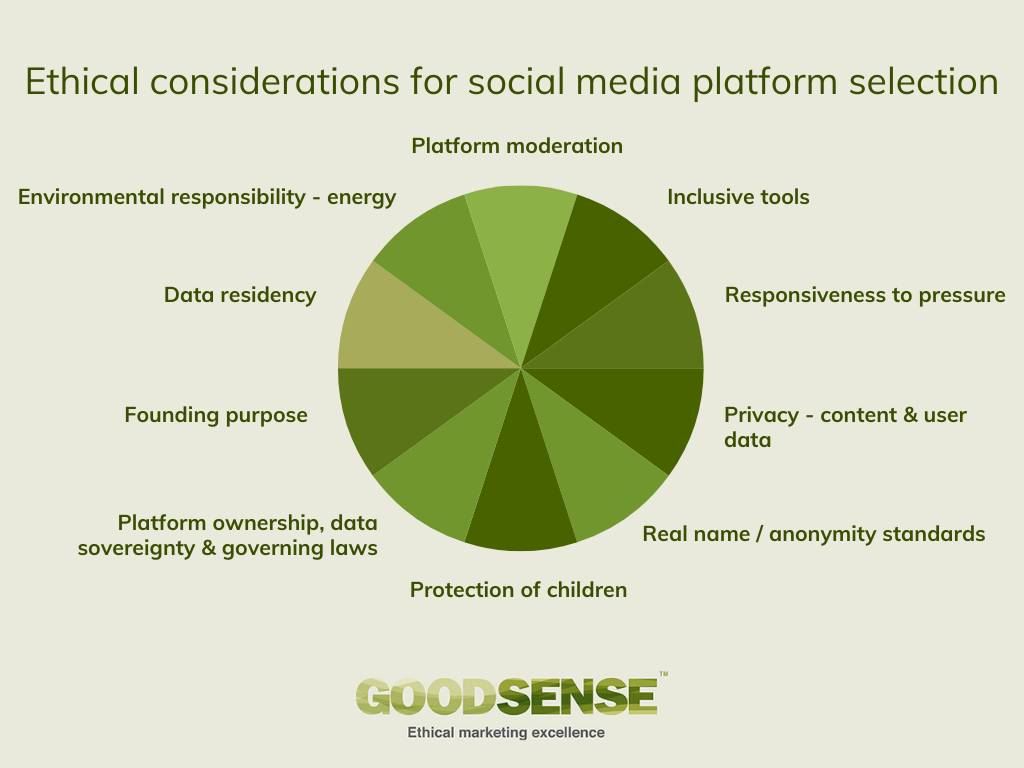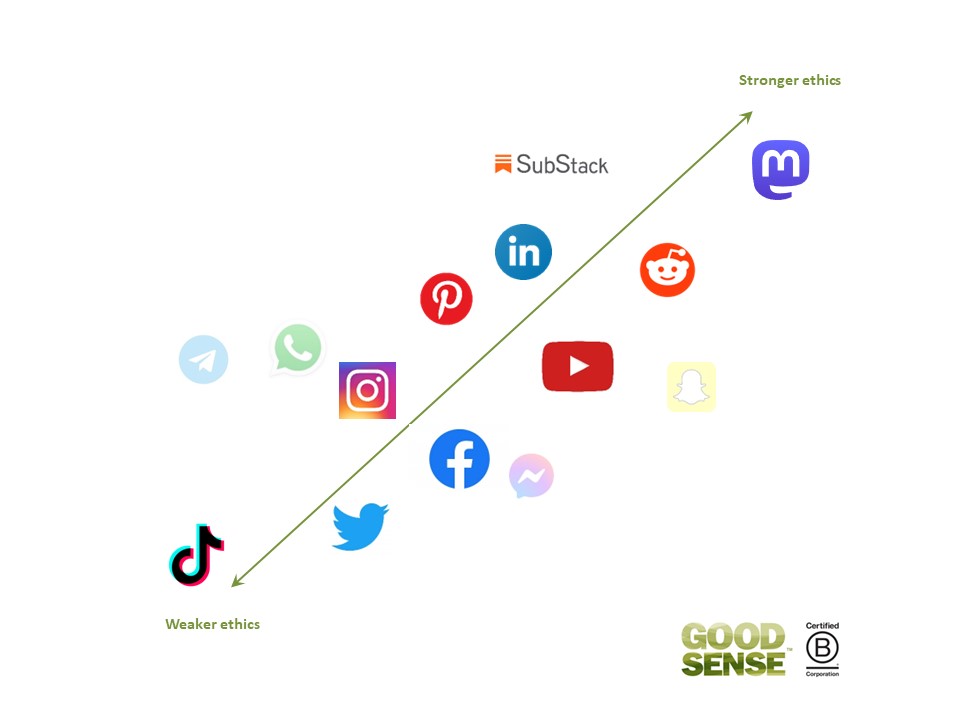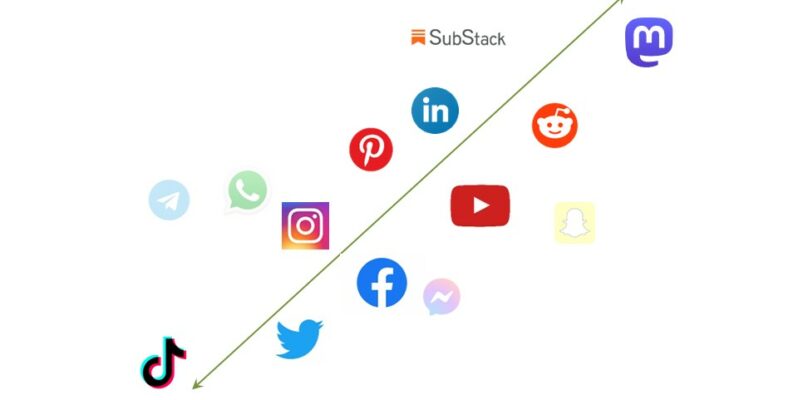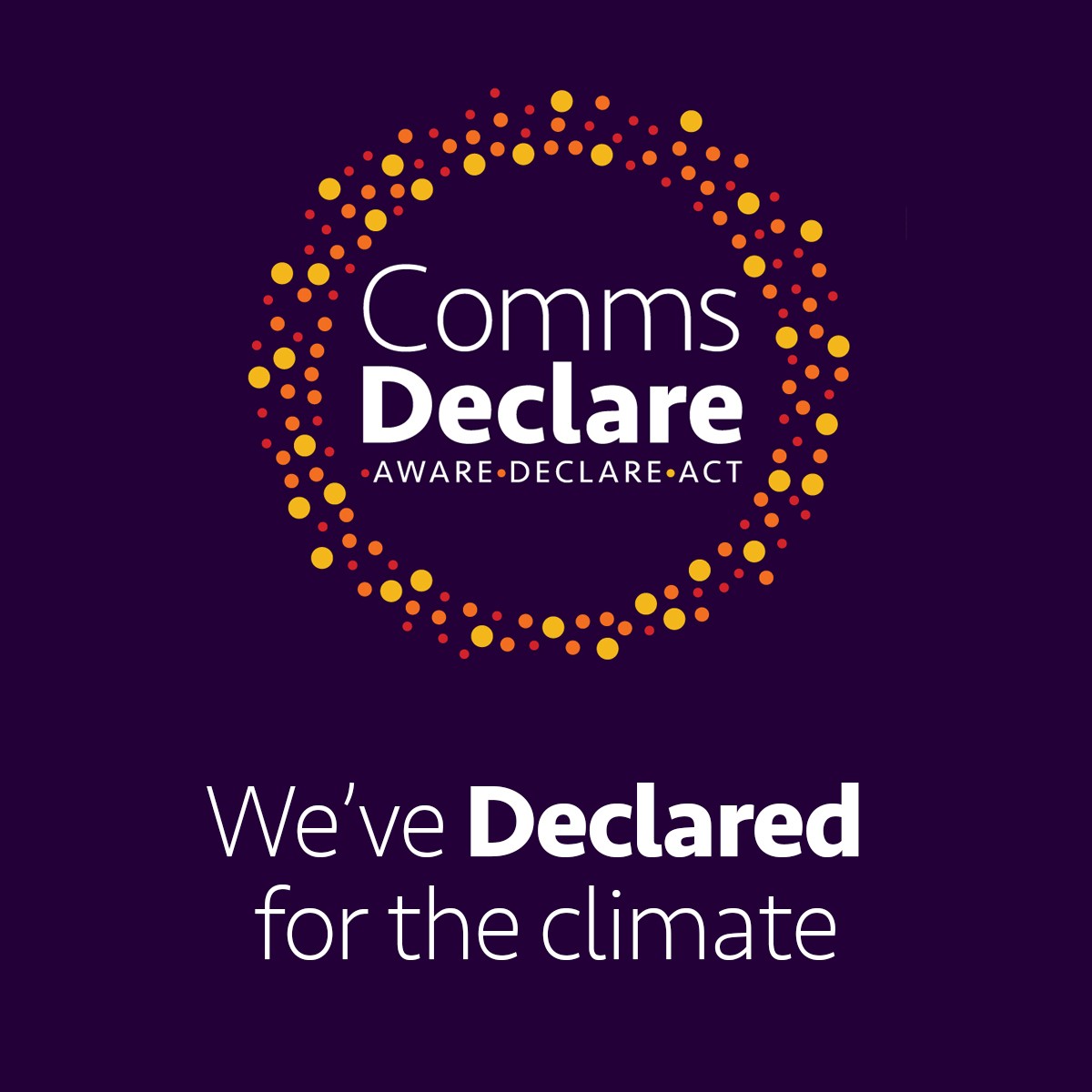Does the ethical approach of the social media channels you use for communications and marketing reflect your values? Or is there a dissonance between your messages and the places you’re putting them? Do you know how to evaluate the ethical differences of social media channels? Or how to advise your Board or management team on the relative risks? In a recent webinar for the Science Communicators Association (SCANZ) we shared our approach to evaluating the relative ethical merits of different social media platforms. We’ve now summarised the content here and welcome your comments or questions below.
Ethical social media is subjective
Organisations marketing sustainability or communicating for the good of people or the rest of nature have strong values and ethical codes. Yet many of these same organisations rely on third party platforms with deeply questionable ethics to promote their good work. At GoodSense we’ve been on our own journey with this. We deleted our Twitter account in November 2022, but announced this on our preferred social platform, LinkedIn, which is itself not immune from criticism. Conducting research on user behaviour, as LinkedIn did over five years, without transparency, is a different magnitude of ethically problematic, in our view, compared to the choices made by the platform formerly known as Twitter, now X, under Elon Musk’s ownership. There is no one right answer to which platforms should be shunned and which embraced by which organisations. Social media platforms are still new tools in human society and, like any 21-year-old, their operating models and management practices are still developing. This means any perspective on ethical social media is both subjective and instantly out of date.
The role of social media
The harmful effects of social media are covered by other media much more than the positive uses and potential to make people feel good. The headlines amplify the bullying, body-shaming, doom-scrolling and misinformation, themselves making us feel less safe. Personal experiences on social media can be deeply traumatic and abusive especially if you’re a woman of colour with expertise or an opinion. But well-run online communities, often run on social media platforms, can be the positive. Research from the Harvard T.H. Chan School of Public Health in 2020 found that using social media every day, in a mindful way, can improve connections, especially for people who otherwise find it hard. Active and well moderated online communities can help people make connections safely, find answers and get support from peers and experts in ways that aren’t always easy or possible in other ways. They can allow people to amplify stories, giving otherwise powerless people a potential bigger reach to others than ever before in history. For people living remotely, or working shifts, or who find it hard to get around physically, or who need to isolate for health reasons, or who don’t know people like them nearby, or who are seeking confidentiality, social media can be a lifeline. When disasters strike, natural or manmade, social media makes it easier to reach out or to keep in touch.
Social media platforms don’t have society’s best interests at heart
The problem is our biggest social media platforms are owned by corporations that have little interest in fostering safe, online communities. There are examples of bad actors and virtue at work on all social media – and so the key question becomes what does each platform reward or safeguard? The corporate owners of the biggest platforms invest hugely to please advertisers through tactics designed to exploit the worst needy, addictive aspects of us all. Tactics like perpetual scroll, algorithms, alerts, privacy suckering and dark patterns, are designed to keep us on the platform as long as possible, maximising the money they make from our presence and data. Our every click and moment has value to them. The profit motive to sell advertising gives preference to content that is click-baity – serving up celebrity and conflict to lure us in. Payers win and vulnerable people suffer most. The drive to monetise social media makes many platforms increasingly hard to use to reach new audiences, unless you pay-to-play. The big platforms’ own brand power – in media, advertising and sponsorship – perpetuates their reach, becoming a self-fulfilling prophesy. User numbers are enormous and almost always presented as the total number of accounts, including inactive and, literally dead, rather than the number of people actively sharing content. Marketers and communicators can feel they are missing out if they aren’t taking part in every platform, increasing the false feelings of ubiquity. People are increasingly wise to the ethical double-bind we find ourselves in when we use social media platforms. According to a November 2021 Washington Post poll of more than 1,000 U.S. internet users, 72 percent do not trust Facebook to responsibly handle their personal information and data. About 60 percent distrust TikTok‘s and Instagram’s ability to do so, and more than 82 percent said they find the targeted online ads seen on all social media platforms to be annoying, invasive, and unhelpful.
The solution is social media strategy
By taking a strategic approach to why and what social media platforms you are using in marketing and communications you can start to find a safe path through this minefield of greed and vested interests. Here’s the approach we recommend to developing an ethical social media strategy for your organisation:
- Define your organisation’s brand or project goals – including the ethical standards and values you want to uphold.
- Specify why you are communicating on social media – what are your objectives for the activity and the impact you want to have. What kind of impact are you seeking through your social media communications – increased reach, deeper dialogue, building a community around a topic, or something else?
- Be clear on who your target audience is – which social platforms are they actively using, why are they there, what are they seeking? Do your research and be as specific as possible in mapping your audiences.
- Then evaluate social media platform options as part of your communications strategy alongside:
- Your other digital channels – websites, email, reports or other publications
- other people’s channels (eg media, journals, conferences etc) and
- physical channels, such as events or placemaking.
Remember, you don’t need to be on multiple social media channels. Managing a social media account well can suck up disproportionate time and energy. It might be worth choosing one social media platform and using it really well to build a community of interest around your content on – putting more energy into fostering connections, reaching out and engaging with others’ content, as well as posting and responding to comments.
Evaluating ethics – our ten ethical issues to consider in your social media strategy
There are multiple ethical issues surrounding social media use as marketers or communicators. We’ve identified ten in this chart. You might place different weights on them, based on your organisation’s values or goals.  You can use these issues to frame your discussions and priorities as you develop your ethical social media strategy. They aim to help holistic thinking about the ethical risks alongside the communication opportunities of your social media.
You can use these issues to frame your discussions and priorities as you develop your ethical social media strategy. They aim to help holistic thinking about the ethical risks alongside the communication opportunities of your social media.
Choosing platforms – our ethical social media platform comparisons
We’ve developed this entirely subjective sliding scale of common social media platforms. It’s based on our assessment of their relative performance across the ten issues identified above. The sliding scale is designed to inspire your own assessments, and to encourage debate. It’s also not comprehensive. It includes obvious gaps and biases, omitting Weibo, for instance, and refers to the platform now called X with its former Twitter logo. Please forgive us its failings and develop your own improved version. We’d love to see what you make.

Appearing from bottom left to top right: TikTok, X (formerly known as Twitter), Telegram, Meta’s platf0rms (WhatsApp, Instagram, Facebook and Messenger), Pinterest, YouTube, LinkedIn, SnapChat, Substack, Reddit, Mastodon.
The range of platforms and their relative ethical performances is changing all the time. We’re interested, for example, in Mastodon open funding models, such as OpenCollective, and the alternative they might present to advertising based funding models. We’re also curious in how Reddit navigates trying to monetise their platform and the way the community is responding to this, such as the API subreddits protest. We worry about the concentrations of ownership with WhatsApp, Messenger, Facebook and Instagram all owned by Meta. And about the huge hoard of daily data on the lives of our children, worldwide, held by TikTok. There is no doubt about the power and potential of a well-crafted post, or of a social media campaign that catches the imagination and inspires new people to think or feel in a positive way. We use LinkedIn ourselves and we support clients to use social media platforms in different ways every day. But we also think it’s vital, as marketers and communicators, that we talk about the ethical standards of these social media platforms transparently. That we are clear when we choose and recommend them about how they can compromise the very values and solutions we aim to promote.
If you’d like to talk to us about your own ethical social media dilammas or commission us to facilitate a discussion in house, please do get in touch.













